21st December 2020 Juba, South Sudan
Farewell to South Sudan
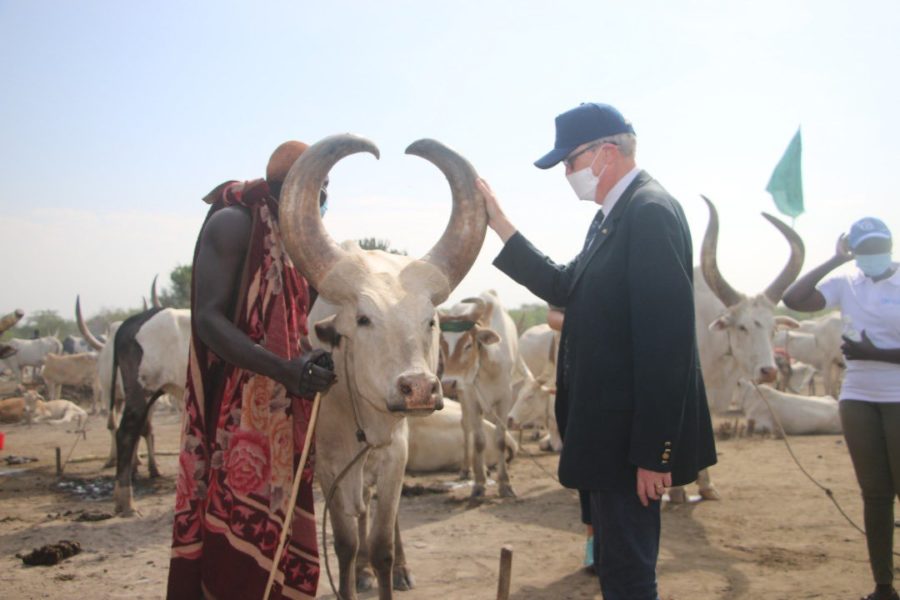
At the start of the year, I wrote a piece on my twenty wishes for 2020. Now that both 2020 and my time in South Sudan are coming to an end, I wanted to reflect on those wishes and, more broadly, my four and a half years working on South Sudan. So much has changed this year and yet so much has also been achieved. I will also take the liberty of setting out my hopes for the future of South Sudan, its people and the UK’s bilateral relationship – I hope my successor doesn’t mind!
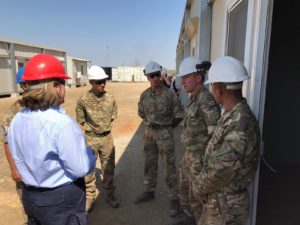 January seems a long time ago and so it’s easy to forget things that happened before the arrival of COVID-19 on the world stage and in South Sudan. The first few weeks of the year saw two senior visitors from the UK. First, the then Armed Forces Minister Anne-Marie Trevelyan who came to present medals to the final rotation of UK military engineers attached to UNMISS under Op TRENTON. And then a visit from HRH The Countess of Wessex, the first member of the Royal Family to come to South Sudan, whose visit focussed on human rights and gender-based issues, culminating with an event to mark International Women’s Day in March.
January seems a long time ago and so it’s easy to forget things that happened before the arrival of COVID-19 on the world stage and in South Sudan. The first few weeks of the year saw two senior visitors from the UK. First, the then Armed Forces Minister Anne-Marie Trevelyan who came to present medals to the final rotation of UK military engineers attached to UNMISS under Op TRENTON. And then a visit from HRH The Countess of Wessex, the first member of the Royal Family to come to South Sudan, whose visit focussed on human rights and gender-based issues, culminating with an event to mark International Women’s Day in March.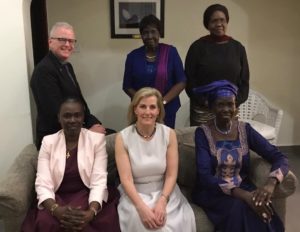
Back then, the unity government has just formed and there was the hope of rapid progress on the peace process and accompanying dividends. However, the spectre of COVID-19 soon loomed large, even if few foresaw global shutdowns and a near downing of the global aviation sector. The impact of the pandemic will be felt for years, not least in South Sudan where the oil price shock will have long-term consequences for the country and region (#18).
COVID 19 has provided a backdrop for delays in government formation and vital aspects of the peace process (including transitional justice) [#7; #8] but these are undoubtedly partly due to an unwillingness of the parties to compromise. It has also very sadly led to a country-wide increase in gender-based violence (GBV) [#9]. I am proud that the UK is taking a leading role in responding to GBV in South Sudan and supporting its victims, as shown by the 16 Days of Activism Against GBV that finished earlier this month.
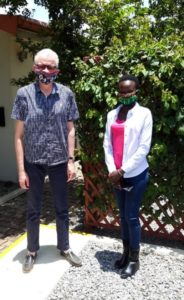 I am very pleased that the Girls’ Education South Sudan programme, to which the UK is the lead donor, has been able to mitigate some of the worst effect of the COVID-19 pandemic by providing girls with cash transfers while schools were closed. Now that schools are beginning to reopen for some, the cash transfers continue, helping mitigate the risk of early and forced marriage, amongst other forms of GBV. However, the loss of a year’s formal education for nearly every school year will undoubtedly have long-term consequences for South Sudan where education and job creation are key if the country is to benefit from its youthful population (#16).
I am very pleased that the Girls’ Education South Sudan programme, to which the UK is the lead donor, has been able to mitigate some of the worst effect of the COVID-19 pandemic by providing girls with cash transfers while schools were closed. Now that schools are beginning to reopen for some, the cash transfers continue, helping mitigate the risk of early and forced marriage, amongst other forms of GBV. However, the loss of a year’s formal education for nearly every school year will undoubtedly have long-term consequences for South Sudan where education and job creation are key if the country is to benefit from its youthful population (#16).
The UK-led Health Pooled Fund has also continued running during the pandemic, helping protect health workers on the frontline and ensure the response to other deadly diseases continues unabated. This has allowed continued treatment and prevention of malaria, measles and other illnesses that lead to preventable deaths. The UK government is working alongside Gavi, UNICEF and others to ensure that cold-storage immunisations help deliver vaccines, including eventually for COVID-19 through the WHO-led COVAX initiative.
One area my twenty 2020 wishes did not cover was the relationship South Sudan has with its northern neighbour, Sudan. As the former UK Special Envoy for Sudan and South Sudan, I continue to follow the politics of Sudan very closely – those who follow me on Twitter will see reference to that fact! The Juba peace talks have been a success with a signing taking place in South Sudan on 3 October. And, it was an historically and symbolically significant moment in November when the border between the two counties re-opened. I hope 2021 can bring further breakthroughs, including with non-signatories to the Juba peace talks.
Just last week, the UK’s current Special Envoy for the Sudans, Bob Fairweather, and I visited Juba and Malakal. Our visit to Malakal was excellent and I hope we landed clear messages with both the Padang Dinka and Shilluk communities about the need for peaceful coexistence no matter how politics plays out.
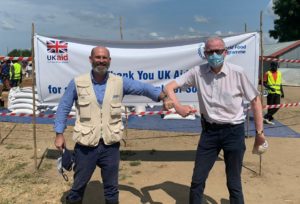 Another trip I had to outside Juba during the final quarter of this year was to Bor and Pibor with the UK Minister for Africa, James Duddridge, and the UK’s first Special Envoy for Humanitarian Affairs and Famine Prevention, Nick Dyer. The combination of violent sub-national conflict, lack of sub national governance structures, flooding and other shocks has led to a significant deterioration of the humanitarian situation. To make matters worse, humanitarians have been prevented from reaching those in need and South Sudan remains one of the most dangerous countries in the world to be an aid worker (#2).
Another trip I had to outside Juba during the final quarter of this year was to Bor and Pibor with the UK Minister for Africa, James Duddridge, and the UK’s first Special Envoy for Humanitarian Affairs and Famine Prevention, Nick Dyer. The combination of violent sub-national conflict, lack of sub national governance structures, flooding and other shocks has led to a significant deterioration of the humanitarian situation. To make matters worse, humanitarians have been prevented from reaching those in need and South Sudan remains one of the most dangerous countries in the world to be an aid worker (#2).
The news last week from the IPC that Western Pibor is almost certainly experiencing famine and another five counties across Jonglei, Warrap and Northern Bahr-el-Ghazal States are experiencing famine-like conditions should be a wake-up call. First and foremost, the government must ensure full and unfettered humanitarian access and work to implement the peace agreement – doing so is a matter of life and death.
As the year draws to a close, I also hope the government can reflect even more on the education, health and justice needs of all the people of South Sudan. Underpinning all of these issues are accountability, security and political will. With that in mind, it is heartening to see parties to the Rome Declaration agree to join the ceasefire monitoring (#4). Despite some significant violence this year, the cessation of hostilities (#1) remains intact and crucial to peace and I am pleased to see steps taken towards ending the cycles of intercommunal violence that blight so many. As such, I leave South Sudan with a hope and a plea: that the parties finalise government appointments by Christmas and allow the first batches of the NUF to graduate. It’s the present the people deserve.
I have thoroughly enjoyed my time as the UK envoy and Ambassador these past four and a half years – having drank from the Nile in 1985, I always knew I would come back some day! As I said to British Embassy staff this week, in my next job as the UK’s ambassador to the Holy See, I shall remain engaged on South Sudan and look forward to the visit to Juba by His Holiness the Pope, as well His Grace the Archbishop of Canterbury, once the peace agreement is implemented. I myself leave this beautiful country with a commitment to you – that wherever I go I will act as an Ambassador for the people of South Sudan, and will continue to advocate for them to achieve the peace and prosperity that they so richly deserve.
This afternoon I left Juba at the end of my posting to South Sudan. Thanks for all the amazing memories – I will never forget! And time for one last video crossing the Nile: pic.twitter.com/Rgi22rGsV6
— Chris Trott (@ChrisTrott) December 18, 2020
I wish you all the best and am optimistic that 2021 will be a good year.
Thanks for the great work you have been doing in South Sudan. The memories of you will never fade, may you have a wonderful Christmas and happy new year in advance ❤️
Amb. Chris Trott, your tenure is valuable to the current active peace in South Sudan. You represented the UK gov’t well and observed the rights for the people of the new nation to enjoy peace. Your wishes are legit and we hope the inclusive approaches shall continue in stabilising the country.
#Peace
Will miss Chris
That’s a superb farewell statement from Amb.Chris. Thank you so much for all what you have done to our people and may God bless 🙏 you
Chris, You have been an outstanding Ambassador – always linking high level strategy to the realities facing people and communities at the grassroots; engaging and communicating actively at all levels; raising difficult but necessary questions; speaking truth to power; promoting discussion. We wish you well in Rome – where the transition to truth and reconciliation, and peace and democracy in South Sudan may be brokered.
Well done ! John Benington, Founding Chair, Friends of Ibba Girls School, South Sudan